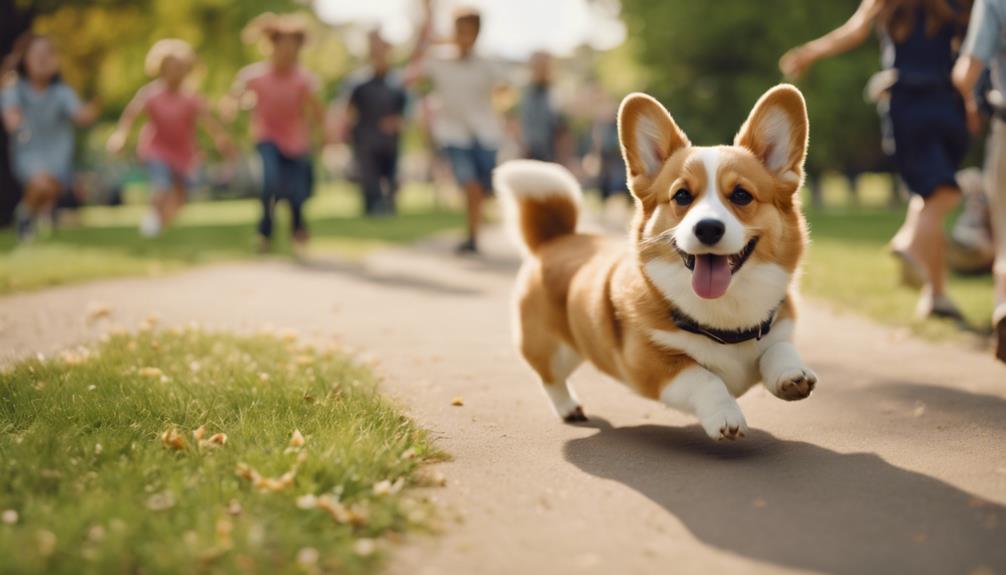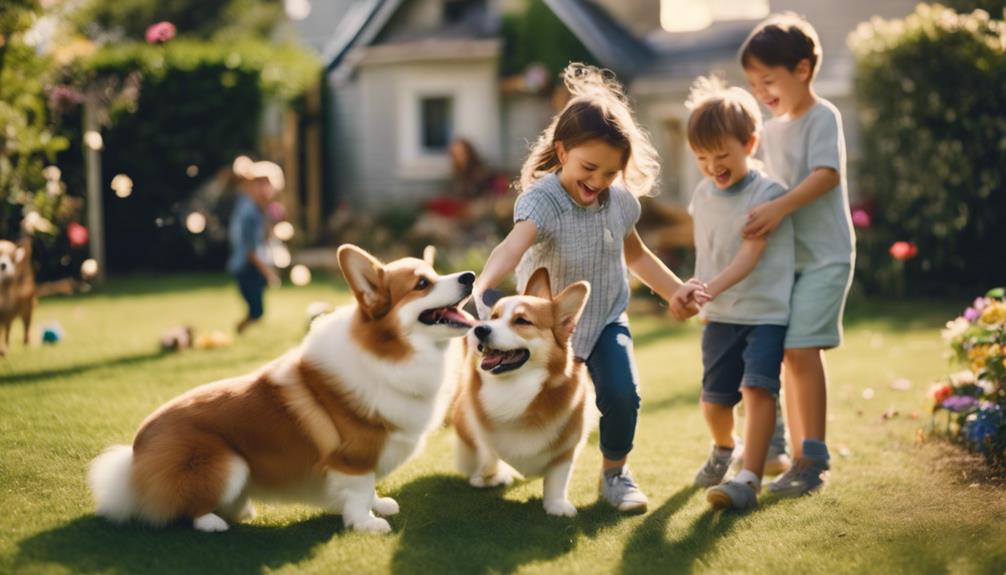In considering the adoption of a Corgi, prospective owners must recognize the essential traits that contribute to a successful partnership. These dogs are not only energetic but also possess unique behavioral characteristics that require thoughtful management. Key aspects such as exercise, grooming, and socialization play critical roles in ensuring a harmonious living environment. However, the journey does not end with understanding these traits; there are deeper implications that can significantly impact both the dog's well-being and the adopter's experience. What other factors should be weighed before making this commitment?
Temperament and Behavior

Understanding the temperament and behavior of Corgis is essential for potential adopters to ensure a harmonious integration into their homes.
Corgis are known for their friendly and affectionate nature, making them great companions. However, they also exhibit unique corgi quirks, such as herding instincts and a tendency to bark at unfamiliar sounds. These traits can sometimes lead to behavioral challenges, particularly if the dog feels anxious or untrained.
Adopters should be prepared to address these challenges through consistent training and socialization. Key behaviors to monitor include:
- Barking
- Herding instincts
Awareness of these traits will help prospective owners foster a loving environment, allowing Corgis to thrive as loyal family members.
Energy Levels and Exercise Needs
Corgis are energetic dogs that require regular exercise to maintain their health and happiness.
Daily walks, playtime, and engaging activities are essential to meet their exercise needs, helping to prevent behavioral issues that may arise from boredom.
Understanding effective energy management strategies will ensure that future adopters can provide the active lifestyle these dogs thrive on.
Daily Exercise Requirements
Daily exercise is essential for maintaining the health and happiness of a Corgi, as these energetic dogs require regular physical activity to thrive. Corgis typically need at least 30 to 60 minutes of exercise daily, which can be achieved through various outdoor activities.
Engaging in brisk walks, jogging, or playing fetch not only fulfills their exercise routines but also helps prevent obesity and behavioral issues. Additionally, Corgis enjoy mental stimulation, so incorporating agility courses or interactive toys during exercise can enhance their overall well-being.
Consistency in their daily activities is crucial, ensuring that they remain active and engaged. Future Corgi adopters should be prepared to integrate these exercise requirements into their daily schedules for a happy, healthy pet.
Playtime and Activities
In addition to regular exercise, incorporating playtime and engaging activities is vital for meeting the high energy levels and exercise needs of Corgis. These dogs thrive on interaction, making the use of interactive toys a great way to keep them mentally stimulated and physically active. Options like puzzle toys, tug ropes, and balls can help prevent boredom and encourage problem-solving skills.
Outdoor adventures are equally important, allowing Corgis to explore and expend energy. Activities such as hiking, playing fetch, or even participating in agility courses provide valuable opportunities for exercise and bonding.
Regularly scheduled playtime not only meets their physical requirements but also nurtures their playful nature, ensuring a happy and well-adjusted companion.
Energy Management Strategies
Effective energy management strategies are essential for ensuring that Corgis remain both physically healthy and mentally engaged, given their naturally high energy levels. To meet their needs, owners should implement various management techniques.
Regular daily exercise, such as walks, play sessions, and agility training, provides crucial energy outlets. Additionally, interactive toys can stimulate their minds, preventing boredom.
A structured routine can help balance activity and rest, ensuring that Corgis do not become overly hyperactive or destructive. Owners should also monitor their dog's behavior and adjust activities accordingly.
Grooming Requirements

How often a Corgi requires grooming largely depends on the individual dog's coat type and lifestyle, but regular maintenance is essential to keep them healthy and comfortable.
Typically, Corgis shed quite a bit, making grooming frequency important. It is advisable to brush your Corgi at least once a week to manage loose fur and prevent matting. During shedding seasons, you may need to increase this frequency to several times a week.
Essential grooming tools include a slicker brush for removing tangles, a bristle brush for smoothing the coat, and nail clippers for maintaining paw health.
Additionally, regular baths can help keep their coat clean, but be cautious not to over-bathe, as this can strip natural oils from their skin.
Socialization With Other Pets
Maintaining a well-groomed Corgi not only enhances their appearance but also plays a role in their overall comfort, which can positively influence their interactions with other pets.
Socialization is essential for Corgis, as it helps them develop strong social skills. Early and frequent pet introductions can ease anxiety and promote friendly behavior.
To create successful introductions, consider these steps:
- Start Slow: Allow pets to observe each other from a distance.
- Controlled Environment: Use leashes initially for safety.
- Positive Reinforcement: Reward good behavior with treats.
- Supervise Interactions: Keep an eye on their behavior to ensure safety.
Training and Intelligence

Training a Corgi requires an understanding of their inherent intelligence and eagerness to learn, making them highly trainable companions. Corgis excel in various training techniques, including positive reinforcement, which encourages desired behaviors through rewards. Their intelligence assessment often reveals these dogs as quick learners, able to grasp commands and tricks faster than many breeds.
To effectively train a Corgi, it's essential to maintain consistency and patience. Breaking training sessions into short, engaging activities helps keep their attention. Regular practice, combined with socialization experiences, enhances their learning potential.
Additionally, providing mental stimulation through puzzle toys or advanced commands can further develop their intelligence. By understanding and harnessing their capabilities, Corgi owners can foster well-behaved and intellectually stimulated pets.
Health Considerations
Understanding the health considerations specific to Corgis is vital for potential adopters, as this breed is predisposed to certain genetic conditions that can impact their quality of life. Awareness of these issues allows for better preventive care and ensures a happier, healthier pet.
Hip Dysplasia: A common issue that can lead to arthritis and mobility problems.
Intervertebral Disc Disease (IVDD): Corgis are susceptible to back problems due to their long spine.
Obesity: This breed can gain weight easily, which exacerbates other health issues.
Eye Conditions: Corgis may develop various eye disorders, such as cataracts or progressive retinal atrophy.
Family Compatibility

Evaluating family compatibility is crucial for ensuring that a Corgi will thrive in a household, as this breed's playful and affectionate nature can significantly enhance family dynamics. Corgis are known for their friendly disposition, making them suitable companions for families with children. However, it is important to assess how a Corgi interacts with young ones.
Here are key considerations:
- Supervised Interactions: Always supervise child interactions to ensure safety and positive experiences.
- Training: Teaching children how to properly interact with the dog fosters respect and gentleness.
Ultimately, a Corgi can become a beloved family member, contributing to joyful moments and lasting memories.
Lifespan and Aging
The average lifespan of a Corgi typically ranges from 12 to 15 years, making it essential for potential adopters to consider the implications of aging in their care and companionship.
As Corgis age, they may experience various health challenges that require thoughtful senior care. Understanding lifespan expectations allows owners to prepare for their dog's needs over time.
- Regular veterinary check-ups become increasingly important.
- A balanced diet helps maintain their health and weight.
- Gentle exercise supports mobility and overall well-being.
Adoption Process Overview

Navigating the adoption process for a Corgi involves several critical steps that ensure both the prospective owner and the dog are well-prepared for a lasting partnership.
First, research local shelters and rescue organizations to find reputable sources and gather essential shelter resources.
Next, consider adoption tips, such as assessing your lifestyle, home environment, and readiness for a pet.
Completing an application is typically required, which may include personal references and a home visit.
After approval, you may meet potential Corgis, allowing for a better understanding of each dog's personality.
Finally, be prepared for an adjustment period, as building a bond takes time.
Following these steps can lead to a successful and fulfilling adoption experience.

